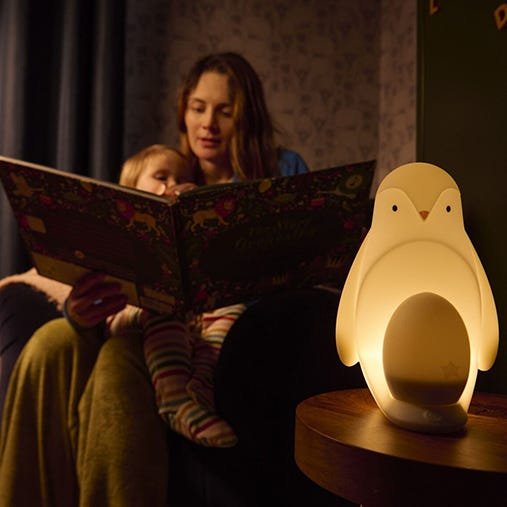We know how it is, you've just got your baby into a lovely bedtime routine, they snuggle down to sleep without fuss and wake at a reasonable time in the morning. Then the clocks change and your toddler's sleeping pattern goes out of the window.
Don't stress. Here are some top tips to help you cope with baby bedtime when the clocks change.
How to avoid baby sleep problems when the clocks change
We suggest delaying the start of your child's bedtime routine a few weeks before the clocks change, settling them 15 minutes earlier or later than usual every few days, until their bedtime has moved.
By the time the clocks change forwards or backwards, your toddler will have altered their sleeping pattern and hopefully stay in bed until the correct wake-up time the next morning. If your child is having daytime naps you will need to adjust these in the same way, along with meal and milk times.
Create a healthy sleep environment
A dark room is invaluable to promote sleep, so using a portable black out blind can make all the difference.
Try to keep your baby's bedroom at a comfortable temperature of between 60-68ºF and keep the noise down.
Using a nightlight or playing soothing music or natural noises can sometimes help reassure a child who is afraid of the dark or easily unsettled at night.
Check out our cute and cuddly sleep aids if your little one needs a bit of reassurance at night.
Have regular sleep and wake up times
Encourage good sleeping habits by sticking to a regular sleep-wake schedule, especially a regular time of getting up in the morning. Try not to change bed time and wake up time by any more than an hour from day to day including the weekends.
Have relaxation time
Encourage your child to enjoy some wind down time prior to sleep. Change their activities to something relaxing and non stressful in the half hour before bedtime. Turn off the TV and computer and read or listen to a story tape for example.
Make sure you say what you mean
For many children saying "go to bed" may no longer mean "go to sleep", but rather "go to your bedroom to amuse yourself". Make bedtime mean sleep time by removing things not associated with sleep such as toys, TV and computer from your child's bedroom.
Set clear boundaries
Have clear and consistent boundaries at bedtime. When you say two stories, mean two stories. Lack of setting limits at bedtime can lead to delayed bedtimes and bedtime battles.
Have a focused bedtime routine
Aim to carry out the same series of steps every night, about 30 minutes before your child goes to bed:
-
A warm relaxing bath lasting about 10 minutes, a pre-bed bath should not be a play time.
-
Go straight from the bathroom into the bedroom - do not go back into the living area.
-
Dim the lights - this will help with the production of the sleep hormone melatonin.
-
Read one or two stories with your child.
-
Say good night, then leave the room.
-
Your child should be asleep about 15 minutes later.
A good diet
A bedtime snack of foods such as banana, warm milk, oat biscuit, and whole grain cereal can help to encourage your child to feel drowsy. That's because these foods contain an amino acid called tryptophan that encourages sleep.
For more advice about foods to choose and foods to avoid before bedtime, check out our guide to foods that aid sleep and encourage your baby to sleep better.
Regular exercise
It's not normally a problem to encourage your little one to run around and play but research has shown that increased physical exercise can encourage sleep. For your toddler this means regular physical play for 20 -30 minutes three or four times a week.
But don't encourage too much energetic exercise within 3 hours of bedtime. Use the time to start winding down to sleep.
Don't forget to praise your child
Children love to hear that they've done something well. So reward your little one with praise every morning when they have kept to your sleep and waking rules.
The most common things that disrupt a child's bedtime routine are:
-
Coming back late from an outing or visiting friends
-
Friends staying over
-
Clocks changing
-
School holidays
-
Family upset or illness
-
Something on TV the kids want to watch
-
Eating the wrong food too close to bedtime
Advice from a sleep expert
Fi Star-Stone is a broadcaster, mum of two and author of The Baby Bedtime Book - Say Goodnight to Sleepless Nights! a gentle sleep guide that covers sleep issues from newborns right up to pre-teen. Here she gives her advice on surviving daylight-saving times.
"Daylight saving time is often the worst time of year for those with little ones as it can wreak havoc on babies and toddlers sleep routines. By following my gentle sleep tips, hopefully you'll find the transition to the new hours, a little easier to manage.
Springtime: Spring forward into a happy baby bedtime.
When we pop those clocks forward it means one hour less sleep for you and your little one, too. But don't panic - you can avoid problems by getting your child ready about a week before the clock change.
My top tip for clock-rockin' baby-bedtime-happiness is to put your little one to bed 10 to 15 minutes earlier each night for seven nights. This simple tip can really help make the transition smoother and the clock change tick tock along nicely.
If you're reading this with less than seven nights to prepare - don't worry, start as soon as you can, even a couple of nights before the clock-change can really help.
With older children, if you are not already using one - use a sleep training clock! These clocks are fantastic and really help little ones to know when it is OK to get up out of bed and come to you.
Autumn time: Fall back into a happy baby bedtime.
For those without little bundles of joy, this means an extra hour of glorious sleep! For us parents - not so lucky. For us it means baby is likely to wake on time - meaning the usual 7am get-up-and-go is now 6am. Ouch.
In the autumn - simply reverse the springtime top tip for a happy baby bedtime! So, starting seven nights before the clock change, put your little one to bed 10 minutes later each night leading up to the clock change.
As mentioned in my springtime tips - with older children, if you are not already using one - use a sleep clock. They're fantastic and really help them to know when it is OK to get up out of bed and get you.
Finally, the week after clock changes you may find your little one is unsettled. Try not to worry - they'll soon settle once they get into the swing of the new season's time zone. By sticking to your usual daily routine, and a happy bedtime routine, you'll soon have a happy sleeper again!"









